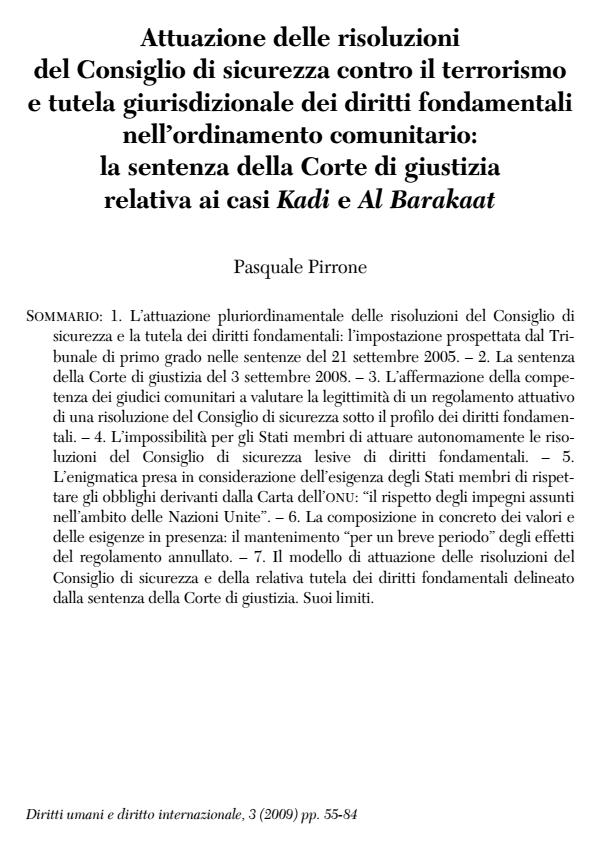Attuazione delle risoluzioni del Consiglio di sicurezza contro il terrorismo e tutela giurisdizionale dei diritti fondamentali nell’ordinamento comunitario: la sentenza della Corte di giustizia relativa ai casi Kadi e Al Barakaat
Titolo Rivista DIRITTI UMANI E DIRITTO INTERNAZIONALE
Autori/Curatori Pasquale Pirrone
Anno di pubblicazione 2009 Fascicolo 2009/1
Lingua Italiano Numero pagine 30 P. 55-84 Dimensione file 235 KB
DOI 10.3280/DUDI2009-001003
Il DOI è il codice a barre della proprietà intellettuale: per saperne di più
clicca qui
Qui sotto puoi vedere in anteprima la prima pagina di questo articolo.
Se questo articolo ti interessa, lo puoi acquistare (e scaricare in formato pdf) seguendo le facili indicazioni per acquistare il download credit. Acquista Download Credits per scaricare questo Articolo in formato PDF

FrancoAngeli è membro della Publishers International Linking Association, Inc (PILA)associazione indipendente e non profit per facilitare (attraverso i servizi tecnologici implementati da CrossRef.org) l’accesso degli studiosi ai contenuti digitali nelle pubblicazioni professionali e scientifiche
The implementation of the Security Council resolutions against terrorism and the judicial protection of fundamental rights in the EC legal system: the ECJ judgment in the Kadi and Al Barakaat cases - UN Security Council antiterrorism measures pose the classic problem to reconcile two different values: security and human rights protection. Furthermore, the implementation of Security Council resolutions gives rise to a multilevel phenomenon, which involves three legal systems (UN - EC - Member State) with different degrees of human rights protection. Particularly, while EC legal order provides for a judicial protection of fundamental rights, in the UN legal system there is no similar kind of protection. So, as far as the EC is concerned, there is the need to ensure its ordinary level and instruments of human rights protection and, at the same time, to enable the Member States to comply with their obligations deriving from UN legal system. Legal solutions to the problem to reconcile the abovementioned values and needs were pointed out, at first, by the Court of First Instance. It stated that EC is bound to abide by UN Security Council resolutions and, consequently, community courts cannot review the legality of the EC regulations implementing Security Council resolutions. They only can value, albeit indirectly, the lawfulness of these resolutions with regard to international peremptory norms. This approach clearly favours the international security and the observance of UN legal system obligations. The ECJ has reversed the abovementioned approach. It has stated that EC regulations implementing UN Security Council resolutions, as all the other community acts, are subjected to the EC principles concerning human rights and to the jurisdiction of community courts. Moreover, striking a dualistic attitude, it has stated that even if it declares the EC regulation implementing a Security Council resolution to be void, that does not compromise the validity and primacy of this resolution. This approach seems to favour human rights protection rather than the value of international security and the need for the Member States to comply with their obligations deriving from UN legal system. Nevertheless, some statements and, above all, some concrete solutions show that the Court does not neglect this value and this need.
Pasquale Pirrone, Attuazione delle risoluzioni del Consiglio di sicurezza contro il terrorismo e tutela giurisdizionale dei diritti fondamentali nell’ordinamento comunitario: la sentenza della Corte di giustizia relativa ai casi Kadi e Al Barakaat in "DIRITTI UMANI E DIRITTO INTERNAZIONALE" 1/2009, pp 55-84, DOI: 10.3280/DUDI2009-001003